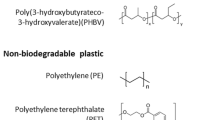Abstract
Millions of tons of plastic waste are released into the marine environment every year. While they steadily accumulate, synthetic polymers provide a habitat for microorganisms. This denominated Plastisphere has been studied in detail over the past ten years. So have the enzymes responsible for microbial degradation, which are unfortunately lacking for most sorts of plastics. Therefore, the BMBF-funded project PLASTISEA is focusing on bioprospecting the marine treasure trove for novel plastic acting enzymes.
Similar content being viewed by others
Literatur
Callaway E (2022) Legendary bacterial evolution experiment enters new era. Nature 606:634–635
Blount ZD, Barrick JE, Davidson CJ et al. (2012) Genomic analysis of a key innovation in an experimental E. coli population. Nature 489:513–518
Borchert E, Hammerschmidt K, Hentschel U et al. (2021) Enhancing microbial pollutant degradation by integrating eco-evolutionary principles with environmental biotechnology. Trends Microbiol 29:908–918
Yoshida S, Hiraga K, Takehana T et al. (2016) A bacterium that degrades and assimilates poly(ethylene terephthalate). Science 351:1196–1199
Taniguchi I, Yoshida S, Hiraga K et al. (2019) Biodegradation of PET: current status and application aspects. ACS Catal 9:4089–4105
Danso D, Schmeisser C, Chow J et al. (2018) New insights into the function and global distribution of polyethylene terephthalate (PET)-degrading bacteria and enzymes in marine and terrestrial metagenomes. Appl Environ Microbiol 84:e02773–17
Buchholz PCF, Feuerriegel G, Zhang H et al. (2022) Plastics degradation by hydrolytic enzymes: the plastics-active enzymes databse-PAZY. Proteins 90:1443–1456
Zadjelovic V, Erni-Cassola G, Obrador-Viel T et al. (2022) A mechanistic understanding of polyethylene biodegradation by the marine bacterium Alcanivorax. J Hazard Mater 436: 129278
Sun J, Prabhu A, Aroney S et al. (2022) Insights into plastic biodegradation: community composition and functional capabilities of the superworm (Zophobas morio) microbiome in Styrofoam feeding trials. Microb Genom 8:000842
Bollinger A, Thies S, Knieps-Grünhagen E et al. (2020) A novel polyester hydrolase from the marine bacterium Pseudomonas aestusnigri — structural and functional insights. Front Microbiol 11:114
Molitor R, Bollinger A, Kubicki S et al (2020). Agar plate-based screening methods for the identification of polyester hydrolysis by Pseudomonas species. Microb Biotechnol 13:274–284
Nöth M, Zou Z, El-Awaad I et al. (2021) A peptide-based coating toolbox to enable click chemistry on polymers, metals, and silicon through sortagging. Biotechnol Bioeng 118:1520–1530
Author information
Authors and Affiliations
Corresponding author
Additional information
Erik Borchert 2008–2013 Bachelor- und Masterstudium der Biochemie an der Universität Jena. 2017 Promotion am University College Cork, Irland. Seit 2018 Postdoc am GEOMAR Helmholtz-Zentrum für Ozeanforschung, Kiel, mit Fokus auf bioinformatische Analysen und Mikrobiologie.
Jennifer Chow 2003–2008 Studium der Biologie (Diplom) an der Universität Hamburg. 2012 Promotion im Labor Prof. Dr. W. Streit. Seit 2012 Nachwuchsgruppenleitung zum Thema Mikrobieller Plastikabbau an der Universität Hamburg.
Ute Hentschel Humeida 1986–1988 Bachelorstudium der Biologie an der Universität Hannover. 1994 Promotion am Scripps Institution of Oceanography, University of California, San Diego, USA, dann Postdoc-Aufenthalte und Habilitation im Fach Mikrobiologie an der Universität Würzburg. 2008 Professur an der Universität Würzburg. Seit 2015 Professorin für Marine Mikrobiologie am GEOMAR, Kiel.
Wolfgang Streit 1984–1989 Studium der Biologie an der Universität Marburg. 1993 Promotion, im Anschluss mehrere Postdoc-Aufenthalte und Habilitation im Fach Mikrobiologie an der Universität Göttingen. 2004–2006 Leitung der Abteilung für Molekulare Enzymtechnologie Universität Duisburg-Essen. Seit 2006 Professor für Mikrobiologie und Biotechnologie an der Universität Hamburg.
Rights and permissions
About this article
Cite this article
Borchert, E., Chow, J., Hentschel, U. et al. Marine Mikroorganismen für den Plastikabbau. Biospektrum 28, 594–596 (2022). https://doi.org/10.1007/s12268-022-1848-9
Published:
Issue Date:
DOI: https://doi.org/10.1007/s12268-022-1848-9




